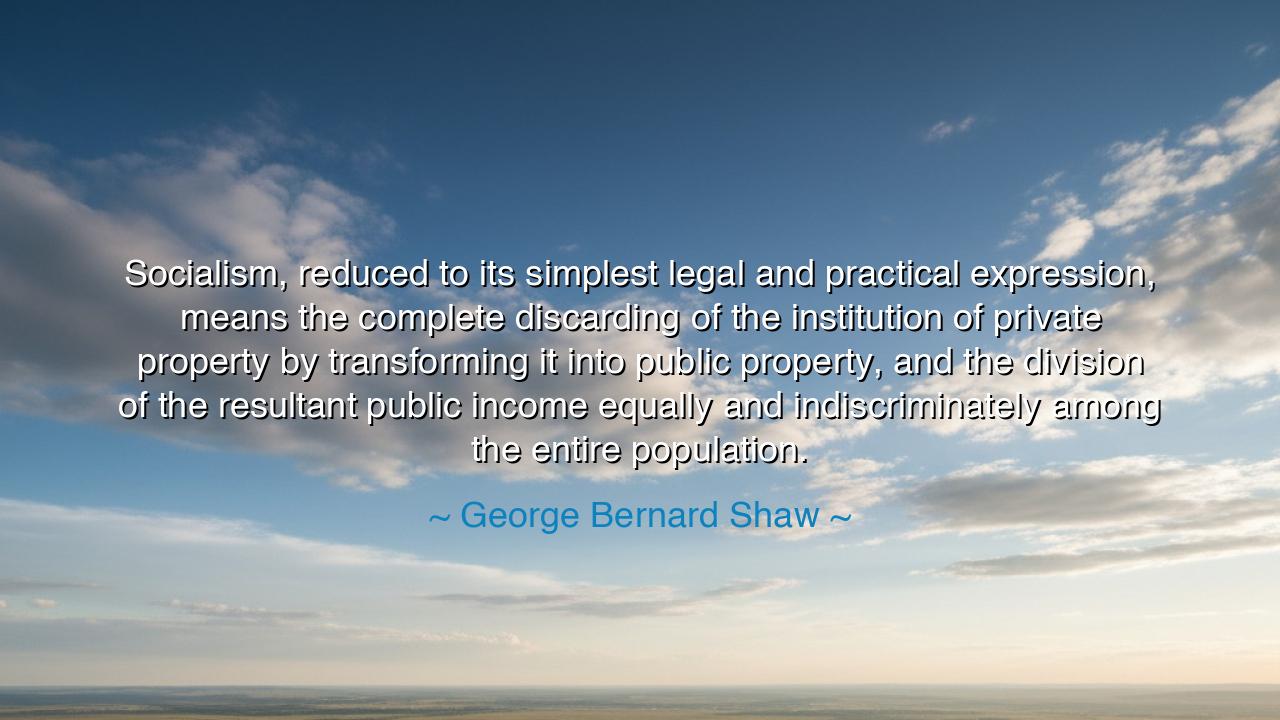
Socialism, reduced to its simplest legal and practical
Socialism, reduced to its simplest legal and practical expression, means the complete discarding of the institution of private property by transforming it into public property, and the division of the resultant public income equally and indiscriminately among the entire population.






Hear the bold declaration of George Bernard Shaw, spoken with the clarity of one who sought to pierce confusion with sharp reason: “Socialism, reduced to its simplest legal and practical expression, means the complete discarding of the institution of private property by transforming it into public property, and the division of the resultant public income equally and indiscriminately among the entire population.” These words strike like a hammer against the foundations of custom, for Shaw unveils in plain form what others cloak in layers of rhetoric. He tells us that at its root, socialism is not half-measure nor compromise, but the radical shifting of ownership itself—from the hands of the individual into the hands of all.
The essence of his teaching lies in the confrontation between private property and public property. Private property, cherished for centuries as the fruit of labor and the shield of independence, is here discarded, not in contempt of labor but in hope of justice. Shaw envisioned a world where no man hoarded while his brother starved, where the bounty of the earth and the wealth of society flowed equally to all, not parceled out by accident of birth or cunning of profit. In this vision, the earth and its rewards are not possessions to be fenced, but inheritance to be shared.
Such an idea did not spring from Shaw alone, but from the long stream of history where inequality sowed discontent. The cries of the peasants during the French Revolution, the strikes of the industrial workers in the 19th century, the weary voices of miners and factory children—all gave rise to this longing for equality. Shaw, with his pen sharper than a sword, sought to express it simply, so no one could mistake the heart of the doctrine: not charity, not reform, but the equal sharing of the public income.
History itself offers both light and warning on this path. In the early Christian community of Jerusalem, as told in scripture, believers held all things in common, and “none among them lacked,” for they sold possessions and distributed according to need. This is socialism in its earliest and most spiritual form—a brotherhood of sharing, born not of law but of love. Yet other examples, such as the Soviet Union, reveal the perils when such sharing is enforced by coercion and stripped of liberty. There, the dream of equality hardened into bureaucracy and oppression, proving that the discarding of private property, if not tempered by justice and freedom, may bring not harmony but sorrow.
The deeper meaning of Shaw’s words is not merely the mechanics of wealth, but the challenge of indiscriminate equality. To divide “equally and indiscriminately” is both the power and the peril of socialism. For in it lies fairness to the poor, yet also danger of indifference to merit and effort. It asks humanity to choose: shall the rewards of the world be distributed by competition, or by common claim? Shaw’s voice did not tremble in declaring the latter, but history demands that we weigh carefully the cost.
The lesson for us is clear: society must always guard against the extremes of greed, where wealth gathers into the hands of the few and the many are left in want. Yet it must also guard against the extremes of enforced equality, where the fire of ambition may be smothered, and freedom may wither beneath the heavy hand of the State. Wisdom, then, lies not only in the dream of socialism nor in the defense of property, but in the balance between justice and liberty.
And what of us, children of tomorrow? Let us not mock Shaw’s vision, nor accept it blindly. Rather, let us wrestle with it, as Jacob wrestled with the angel, until blessing emerges. In our lives, let us give generously, seek fairness in our institutions, and hold one another accountable, that wealth may serve not only the few but the many. Private property may endure, but let it be tempered by the spirit of public responsibility, for in this balance lies the hope of a just society.
Therefore, remember the words of Shaw not as a final decree, but as a torch passed into your hands. Socialism, in its starkest expression, calls us to reflect upon ownership, equality, and justice. The choice of how to live it, refine it, or balance it belongs to each generation. Walk wisely, seek fairness, and never forget: the measure of any society is not how high its richest stand, but whether its poorest are lifted from the dust.






AAdministratorAdministrator
Welcome, honored guests. Please leave a comment, we will respond soon